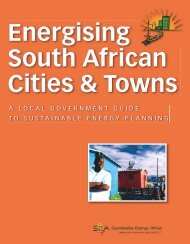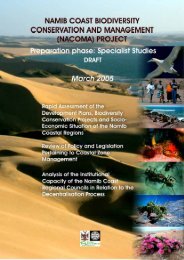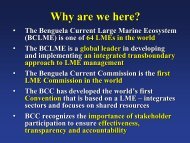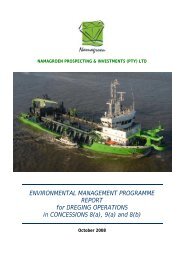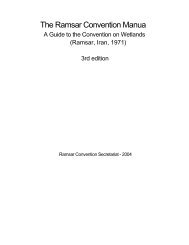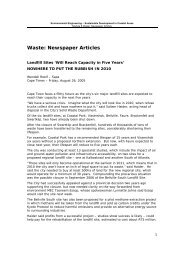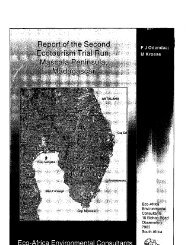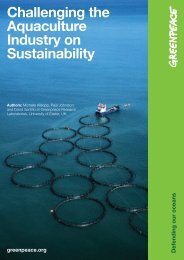Feasibility Study of Proposed Tourism Dev in Shewula, NE ...
Feasibility Study of Proposed Tourism Dev in Shewula, NE ...
Feasibility Study of Proposed Tourism Dev in Shewula, NE ...
Create successful ePaper yourself
Turn your PDF publications into a flip-book with our unique Google optimized e-Paper software.
Chapter 2 • Situational Assessment<br />
agriculture, handicrafts and with the service sector. However, Swaziland has yet to<br />
def<strong>in</strong>e its tourism product, thus result<strong>in</strong>g <strong>in</strong> the marg<strong>in</strong>alisation <strong>of</strong> the country as a<br />
tourism dest<strong>in</strong>ation. This could have major implications for the future <strong>of</strong> natural<br />
resource management <strong>in</strong> the country. Without the added value that tourism br<strong>in</strong>gs to<br />
rural development and conservation, the resources <strong>of</strong> agriculturally marg<strong>in</strong>al areas<br />
cannot be susta<strong>in</strong>able developed, and hence the country's biodiversity will be at risk.<br />
2.6.2. <strong>Tourism</strong> promotion and trends <strong>in</strong> Swaziland<br />
2.6.2.1. <strong>Tourism</strong> promotion <strong>in</strong> Swaziland<br />
Swaziland is extensively promoted as a tourist dest<strong>in</strong>ation with<strong>in</strong> the Southern<br />
African subregion and abroad, us<strong>in</strong>g the slogan 'Swaziland, the Royal Experience'..<br />
The Hotel and <strong>Tourism</strong> Association is an active promotional arm <strong>of</strong> the <strong>in</strong>dustry, while<br />
<strong>in</strong>ternational and regional tourism fairs (such as the World Travel Market which is<br />
held <strong>in</strong> London, and INDABA, which is held <strong>in</strong> Durban) provide further opportunities<br />
for exposure. Swaziland is a member <strong>of</strong> the Regional <strong>Tourism</strong> Organization <strong>of</strong><br />
Southern Africa (RETOSA).<br />
2.6.2.2. <strong>Tourism</strong> trends <strong>in</strong> the world<br />
<strong>Tourism</strong> has now become the world's most important civil <strong>in</strong>dustry, with nature-based<br />
tourism undergo<strong>in</strong>g the fastest growth. This <strong>in</strong>cludes ecotourism, which has emerged<br />
as a feasible option for both conserv<strong>in</strong>g the natural and cultural heritage <strong>of</strong> regions,<br />
and for contribut<strong>in</strong>g to susta<strong>in</strong>able development. 70 Overall the tourism <strong>in</strong>dustry is<br />
expected to double by the year 2005 from the figures <strong>in</strong> 1992. 71<br />
This explosive growth <strong>in</strong> the ecotourism market has created the potential for<br />
unprecedented development <strong>of</strong> the economic, social and <strong>in</strong>frastructure components<br />
<strong>of</strong> the Southern African environment. The ecotourism market is, however, dependent<br />
on the ma<strong>in</strong>tenance <strong>of</strong> biodiversity and ecological <strong>in</strong>tegrity that is aesthetically<br />
pleas<strong>in</strong>g and thus able to attract <strong>in</strong>ternational markets. Thus, the rapid and<br />
uncontrolled development <strong>of</strong> the tourism sector has placed significant pressure on<br />
the environment <strong>in</strong> other parts <strong>of</strong> the world, and has placed the very reason for the<br />
existence <strong>of</strong> ecotourism under threat, i.e. if the tourism product is impacted, tourism<br />
to the area will be impacted.<br />
2.6.2.3. <strong>Tourism</strong> trends <strong>in</strong> Swaziland<br />
At present, the Swaziland tourism <strong>in</strong>dustry is largely stagnant, with little new<br />
development over the past fifteen years and <strong>in</strong> many cases a noticeable decl<strong>in</strong>e <strong>in</strong><br />
the number and quality <strong>of</strong> hotel beds on <strong>of</strong>fer. The market base <strong>of</strong> Swaziland has<br />
slowly been eroded as the neighbour<strong>in</strong>g countries have stabilised politically, and as<br />
more diverse attractions <strong>in</strong> neighbour<strong>in</strong>g countries have emerged. Thus decl<strong>in</strong><strong>in</strong>g<br />
pr<strong>of</strong>itability and market contraction, fuelled by complacent government attitudes has<br />
resulted <strong>in</strong> a grow<strong>in</strong>g lack <strong>of</strong> confidence between government and the private sector.<br />
This tends to h<strong>in</strong>der fresh <strong>in</strong>vestment. 72<br />
The local tourism <strong>in</strong>dustry tends to be characterised by short average stays <strong>of</strong> one or<br />
two nights. Because Swaziland is too small to stand alone as an <strong>in</strong>ternational tourist<br />
dest<strong>in</strong>ation, her tourism <strong>in</strong>dustry relies on be<strong>in</strong>g a transit market for South Africans<br />
De Vletter, R. 1997: Annex 3. Susta<strong>in</strong>able Natural Resource Management: Sector Analysis, unknown citation.<br />
70<br />
Anonymous, 1998: Swaziland <strong>Tourism</strong> Potential Atlas, unknown citation.<br />
71<br />
WTTC, 1992: <strong>in</strong> Swaziland <strong>Tourism</strong> Potential Atlas.<br />
72<br />
Prime M<strong>in</strong>ister's <strong>Tourism</strong> Task Force. 1997, op cit.<br />
59




